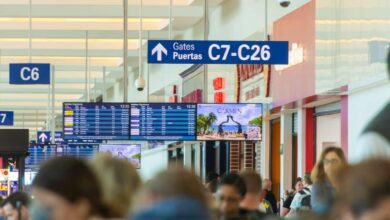US universities warn international students amid Trump’s 2025 travel ban

US universities are issuing urgent advice to international students in response to the The Trump administration’s proposed reintroduction of a travel ban targeting nationals of several countries. The policy, which is expected to come into effect later this year, has raised concerns about its impact on the academic mobility and safety of international students.
Several higher education institutions, including the University of Massachusetts Amherst (UMass) and Cornell University, have released guidelines urging students from potentially affected countries to exercise caution and seek advice before traveling. The Office of Global Affairs at the University of Massachusetts Amherst has a statement advising international students and scientists to “refrain from international travel” if they come from countries subject to the previous bans or anticipate the impact of new restrictions.
Cornell University also has one detailed adviceraising concerns about the “potential impacts of upcoming immigration changes.” In its guidelines, the university emphasized the importance of staying abreast of developments and consulting immigration lawyers if necessary. “Cornell is committed to supporting its international students and scholars during this period of uncertainty,” the advisory said.
“The ban likely also applies to citizens of the countries targeted by the first Trump administration: Kyrgyzstan, Nigeria, Myanmar, Sudan, Tanzania, Iran, Libya, North Korea, Syria, Venezuela, Yemen and Somalia. New countries could be added to this list, in particular China and India,” the advisory continued.
The Open Doors report, a data initiative supported in part by the US Department of State, reveals that During the 2023-2024 academic year, more than 1.1 million international students enrolled at U.S. colleges and universities.
Indian students represent the largest group among these enrollees, followed by students from China and South Korea. Together, Indian and Chinese students make up more than half of the international student population in the United States.
Universities mobilize support for affected students
In addition to issuing travel warnings, universities are stepping up efforts to provide resources to affected students. Legal clinics and immigration assistance offices at schools such as Harvard University and the University of California system have pledged to help students navigate the complex immigration landscape.
According to The PIE newsHigher education leaders have sounded the alarm about the potential damage to the global standing of American universities. “These policies threaten to undermine the diversity and inclusion that characterize American higher education,” said a spokesperson for the American Council on Education. Universities fear the ban will deter international students, who contribute billions annually to the U.S. economy and play a crucial role in research and innovation.
Details of the 2025 travel ban
The proposed 2025 travel ban, an updated version of the Trump administration’s 2017 executive order, is expected to target nationals of Iran, Libya, Somalia, Syria, Yemen and more. It will limit their ability to obtain visas for travel to the United States, including for educational purposes. The government has justified the policy as a measure to enhance national security.
Critics argue that the ban disproportionately affects people from predominantly Muslim countries and that there is insufficient evidence to justify its impact on reducing threats. Organizations such as the American Civil Liberties Union (ACLU) are preparing to challenge the policy in court, citing constitutional and human rights violations.
As universities brace for the potential fallout, international students and scholars remain at the center of a contentious debate that could reshape the landscape of American higher education. For many, the travel ban represents a critical test of the country’s commitment to global engagement and academic freedom.




